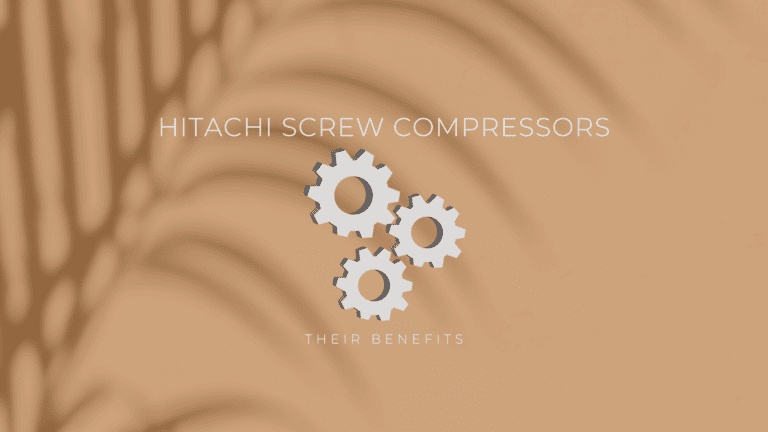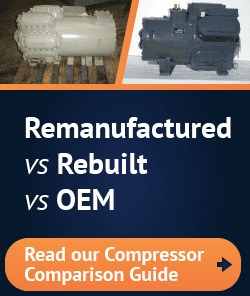Choice of compressor is one of the most important selections for any commercial HVAC or refrigeration system. Compressors come in a variety of styles, most with performance qualities very different from the conventional compressor using piston-based displacement.
The technology behind your compressor determines factors like its size, load capabilities, and working environment it is best suited for. On the other hand, your choice of compressor brand can make a big difference in overall maintenance and how to get expert help with the unit.
Screw compressors are becoming more popular for mid-sized applications in commercial and industrial settings. Like many of today’s compressors, they have been designed to compensate for well-known issues that can develop with reciprocating compressors, like mechanical wear and tear.
Although many compressor companies were founded here in the United States, almost all have sophisticated multinational operations these days. It is a good idea to check into all your options before you select your screw compressor, and one brand you shouldn’t overlook is Japan’s Hitachi.
Hitachi’s reputation for quality has made it one of today’s leaders in screw compressors.
Why Choose a Screw Compressor for Your Next HVAC or Refrigeration System?
It is no surprise to say the average commercial HVAC or refrigeration system has far higher demands than those placed on a consumer system. While reciprocating compressors have some valuable commercial uses, such as small-scale refrigerated display cases, something more is usually needed.
The advantages of a screw compressor make it well-suited for demanding settings with larger loads. A screw compressor is more reliable for continuous use. And, overall, the operating principles of a screw compressor make it more efficient. Hitachi’s screw compressors deliver all these benefits at a high level.
Compared to a piston compressor, a screw compressor:
1. Offers Smooth, Consistent Motion
The paired rotors of a screw compressor move refrigerant gas from the suction end through the compressor without ever being in contact. This eliminates the mechanical wear that develops on the active surfaces of a piston compressor. What’s more, output is much smoother. This isn’t only an aesthetic consideration – it reduces the likelihood of spikes and surges as the unit draws electricity throughout the day.
2. Reduces Noise While in Operation
When buying a reciprocating compressor, many facilities managers look for the smallest units that will do the job. One reason this is so crucial is that the compressors can be very loud: After all, the pistons are making contact constantly. A screw compressor is by no means silent, but it is much quieter. This protects your hearing and gives you more options when it comes to where to situate your unit in the workspace.
3. Are Much More Energy Efficient
All in all, screw compressors are far more energy-efficient than reciprocating compressors. This helps to keep the cost of ownership lower despite the wide range of sizes and output levels. Optimizing your compressor to the job at hand can save you thousands of dollars on your annual energy bills. Likewise, you can rest assured you are doing your part to manage your company’s environmental impact.
4. Are Cost-Effective
It was not that long ago when the cost of a screw compressor was substantial. Manufacturers, including Hitachi, developed these systems to tight tolerances that were difficult to achieve at the time. Over the years, the cost of a screw compressor has steadily declined. Combined with its lower operating costs, a screw compressor can be a budget-friendly choice. Regular maintenance can keep the unit running reliably for years to come.
Hitachi Stands Out as a Top Screw Compressor Manufacturer
Founded in 1910, Hitachi has been at the forefront of industrial technology throughout its long history. Among its earliest innovations was Japan’s first-ever 4-kilowatt induction motor. This made Japanese copper mining far more competitive at a time when the country had only recently opened to trade from the West.
Its earliest screw compressor was released in 1911. Since then, its compressors have been lauded throughout the industry. Hitachi is one of the world leaders in balancing performance with efficiency, and offers some of the highest energy efficiency on average of any compressor brand.
Hitachi screw compressors come in both oil-injected and oil-free models. Oil-free models do not use oil in the compression chamber. As a general rule, they are lighter and less expensive. On the other hand, oil-injected models are more durable and thus more suited to heavy duty industrial applications.
To maximize effectiveness of a Hitachi product, it’s wise to invest in a remanufactured commercial compressor. During remanufacturing, a unit is completely disassembled and components are checked end-to-end. The unit is cleaned and can be thoroughly tested. Working with a remanufacturer not only delivers immediate savings and faster deployment, but it means you have a trusted local partner for your future maintenance needs.












